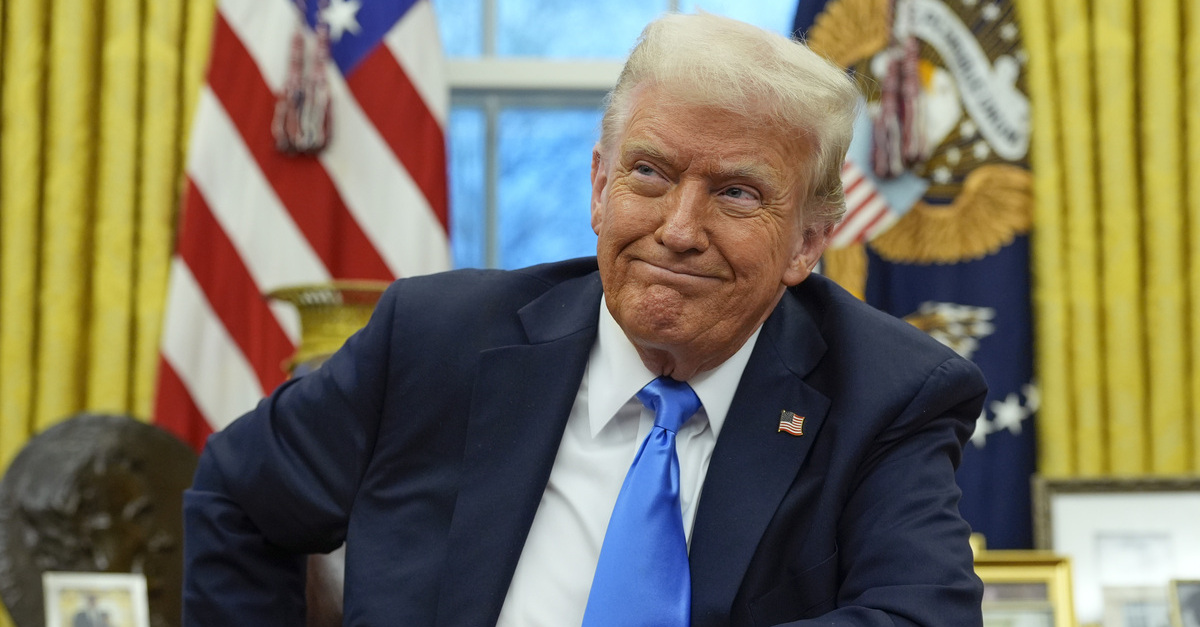
President Donald Trump speaks with reporters in the Oval Office at the White House, Tuesday, Feb. 11, 2025, in Washington, D.C. (Photo/Alex Brandon).
The Trump administration has hung “a sword of Damocles” over the heads of teachers and schools in their efforts to forbid diversity, equity, and inclusion (DEI) initiatives in public education, a lawsuit filed Wednesday in New Hampshire federal court alleges.
On Valentine’s Day, the civil rights division within the U.S. Department of Education (DOE) sent out a “Dear Colleague” letter to educational institutions that receive federal funding. The government warned institutions “must cease using race preferences and stereotypes as a factor in their admissions, hiring, promotion, compensation, scholarships, prizes, administrative support, sanctions, discipline, and beyond” or “face investigation and loss of federal funding.”
The plaintiffs, in their 48-page lawsuit, said the DOE’s guidance amounts to a “fundamental contradiction” by referencing civil rights law, violates “due process in failing to set clear standards,” and chills “First Amendment protected speech and expression” in a way that “could not stand no matter the process followed.” To that end, the correct — mandatory — process was not followed, the lawsuit adds.
“The Letter fails to acknowledge — let alone explain — its marked change from [the DOE’s] prior guidance and interpretations of Title VI, as well as other federal civil rights and education laws,” the filing reads. “And it fails to account for reliance interests created by decades of law, regulations, and longstanding agency guidance and interpretations. Moreover, it exceeds [the DOE’s] authority and is contrary to law, including the body of law it purports to interpret.”
Led by the National Education Association and its New Hampshire affiliate, the lawsuit seeks a declaratory judgment that the Feb. 14 letter violates the First and Fifth Amendments, that the letter is “arbitrary, capricious, an abuse of discretion, not in accordance with law, contrary to constitutional right, in excess of statutory jurisdiction, and without observance of procedure required.”
The chief problem with the letter, according to the plaintiffs, is that it is unconstitutionally vague because it relies on “conclusory and unsupported generalizations” while at the same time offering “no guidance that would help a school to understand how [the DOE] would apply existing legal precedent to reach these conclusions.”
These “sweeping conclusions about the existence of legal violations across states, local educational agencies, and educational institutions” amount to defects that make it impossible for people to understand what, exactly, is being changed, how to abide by the changes, and on what authority the changes are even being made. And this state of affairs violates the constitution, the lawsuit alleges.
“The Letter is impermissibly vague and violates the Fifth Amendment due process rights of Plaintiffs,” the filing reads. “All of its prohibitions are unclear and undefined, broad in scope, and turn on subjective judgement. To take an example, although the Letter asserts that ‘DEI programs’ unlawfully ‘discriminate,’ it fails to define what constitutes a ‘DEI program,’ explain how such programs ‘preference’ certain racial groups, or provide criteria for determining the circumstances under which educational programs that in any way address race might violate federal anti-discrimination law.”
Other examples follow:
Member B is an 8th Grade Social Studies teacher who covers United States history from the Civil War to the modern era, including state-required instruction on genocide and antisemitism and lessons on Juneteenth, the Reconstruction era, the Civil Rights Act of 1866, the Fourteenth and Fifteenth Amendments, the Black Codes, the KKK, the Jim Crow Era, the Compromise of 1877, the Tulsa race massacres, and other topics that necessarily touch on concepts of race, racism, and slavery. She does not know how she can teach or facilitate student research and discussion of these topics without creating a risk of being accused of violating the Letter’s vague conception of illegal discrimination. She feels that she is being held hostage to students and parents’ vague conceptions of discrimination and DEI under the Letter, which creates a risk to her career through its reporting mechanisms
More Law&Crime coverage: ‘Planned eliminations’: Reinstated Biden ethics enforcers proving to be a real thorn in Trump’s ability to fire federal workers
As a close second, the letter also infringes on First Amendment rights to free speech and free association, the plaintiffs allege.
“The Letter unconstitutionally penalizes the protected speech of Plaintiffs’ members by threatening to withhold federal funding from any educational institution that provides a ‘DEI program,”” the lawsuit reads.
And, to hear the plaintiffs tell it, the Trump administration made matters worse for teachers with the late February announcement of a website where “members of the public” are invited to upload so-called “receipts of betrayal” that identify educational institutions that promote “divisive ideologies and indoctrination.”
The filing predicts a dire upshot from such efforts, at length:
The loss of federal funding would be devastating to almost any educational institution, including the institutions that employ Plaintiffs’ members. A [DOE] investigation premised on the vague prohibitions in the Letter, in conjunction with the so-called “receipts of betrayal,” would impose onerous legal, administrative, and reputational costs on the targeted institution.
To avoid these costs, it is foreseeable that educational institutions will take steps to suppress any expression that could be construed as a “DEI program.” Because the Letter does not offer any guidance as to what constitutes a DEI program, any curricular or even extracurricular speech at an educational institution that conceivably runs afoul of [the DOE’s] positions on race, diversity, equity, or inclusion is at risk of being censored or penalized.
Plaintiffs’ members reasonably fear that their educational institutions will investigate, discipline, or take other adverse action against them if they continue to discuss with students issues pertaining to race, diversity, equity, or inclusion. Plaintiffs’ members also fear adverse action if they continue to assign readings, invite guest speakers, or engage in discussion and debate with students on anything that might be construed to fall within these prohibited categories
The lawsuit also complains the letter and its associated guidance was improperly issued by the agency and subagency in question.
“The Letter reflects final agency action,” the lawsuit reads. “It sets forth substantive obligations that it vows to ‘vigorously enforce,’ declares [the DOE’s] intention to ‘take appropriate measures to assess compliance with the applicable statutes and regulations based on the understanding embodied in th[e] letter,’ invites complaints, and announces that [the DOE] will begin enforcement as of February 28, 2025. Yet throughout the Letter, [the DOE] wholly eschews the congressionally imposed procedures designed to ensure that agency actions are not arbitrary and capricious but reasoned and within their sound expertise.”
At the heart of the matter is the plaintiffs’ belief that the Trump administration is attempting to dictate school curriculums and teachers’ lesson plans in order to root out the bugbear of DEI.
“In addition to its many procedural failings, the Letter’s substance is contrary to the constitutional rights of academic institutions and educators,” the filing goes on. “In its parts and as a whole, the Letter mandates compliance while at the same time leaving schools and educators without clear notice of the law, opening them to arbitrary and discriminatory enforcement. And it further oversteps the federal government’s role by reaching into curriculum, chilling the free speech and scholarship of academics and educators, and likewise impinging on the ability of students to hear perspectives the federal government finds objectionable.”
Love true crime? Sign up for our newsletter, The Law&Crime Docket, to get the latest real-life crime stories delivered right to your inbox.
And, in service of this effort, the DOE is playing fast-and-loose with language while rewriting and ignoring the relevant law, the lawsuit says. Here, specifically, the plaintiffs accuse the government of misapplying and misinterpreting the landmark 2023 U.S. Supreme Court decision barring colleges from affirmative action in admissions.
“The decision only addressed race as a formal admissions factor in higher education — it did not ban curriculum, student groups, DEI programming, or race-neutral diversity initiatives,” the American Civil Liberties Union, whose attorneys are representing the teachers union plaintiffs, said in a press release announcing the litigation.
The lawsuit, at its core, also reads as a full-throated endorsement of DEI principles from the nation’s largest labor union.
The original petition begins:
“The vigilant protection of constitutional freedoms is nowhere more vital than in the community of American schools.” Our schools cannot fulfill their role as the nation’s “nurseries of democracy,” without teaching students about the world, including the historical and lived experiences of people of different races, genders, and abilities. Diversity, equity, and inclusion initiatives are critical to that effort by both expanding equal educational opportunity and providing students with an education that prepares them to succeed in a diverse democratic society.







